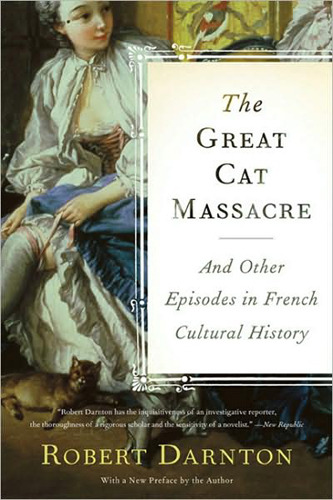Level: Adult
Genre: Nonfiction > History > Essays
Obtained: Purchased at Jefferson College bookstore
Reviewed by: Nic Echo
About the Book:
This series of essays (or one long essay, depending on how you view it) looks into tales and writings to try and decipher how a variety of men from 18th century France would have thought.
Rating: 8/10
First off, I will admit that I did not finish the entirety of the book so I am unable to make a judgement on the last section of The Great Cat Massacre. The book seemed stale to me by that time, to be honest. Overall, however, I found the book to be quite enjoyable, and it was certainly more interesting than most academic texts that I am forced to read. The author starts us off at the lowest rung of the social ladder and takes us higher with each section. One of the things that made this book a fairly great read (especially for the classroom) was the fact that the text actually delved into the lower class, something that we rarely see in historical academics. It helped to have a better idea at understanding all the classes rather than getting a taste for only the nobility and intellectuals. What else made The Great Cat Massacre interesting was that each section held a slightly different feel to it. Overall, it still looked at tales and writing, bringing forth deductions from the examples, but you could still see a difference between the peasants' fairy tales and say, the writings of the the bourgeois. Of course, with these differences, one may enjoy one section while finding another dull beyond belief. For example, I had to sludge and force my way though the intellectuals since it had a very academic type writing to it. It made sense for it to have this feel, but it didn't make it any less boring to me.
Overall though I felt that the greastest downfall of The Great Cat Massacre was the fact that it was too repetitive. Both a fellow classmate and I agreed that most of the sections made their point halfway through. This let her dragging and me skimming. What's more, after said point was made, the author wasn't even bringing forth new points, just new examples, making it even more redundant. Now, I realise that if you show that a point shows up in multiple examples, it strengthens your argument. However, there is a thing as too much.
All together, The Great Cat Massacre gives a good insight into the minds of the 18th century Frenchman, which can allow us to better understand some of the works written from that era. Just hopefully, Darnton will cut down on the examples next time.
What I'm Reading Next:


No comments:
Post a Comment